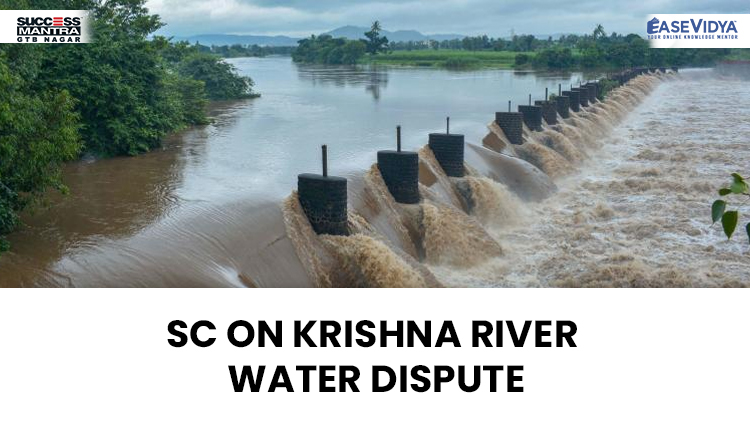
SC ON KRISHNA RIVER WATER DISPUTE
SC ON KRISHNA RIVER WATER DISPUTE
On February 18, 2022, the government of Karnataka moved to the Supreme Court and sought to set up a bench to hear a plea related to a dispute over allocation of water of Krishna River. The Krishna River flows in states of Maharashtra, Karnataka, Andhra Pradesh, and Telangana. SC bench comprising Justice D Y Chandrachud from Maharashtra, and Justice A S Bopanna from Karnataka, had recused itself from the case on January 10, 2022, arising out of the decision of the water tribunal. The judges recused themselves, because they were upset with the tone of mails and letters against them for being part of this bench on water dispute.
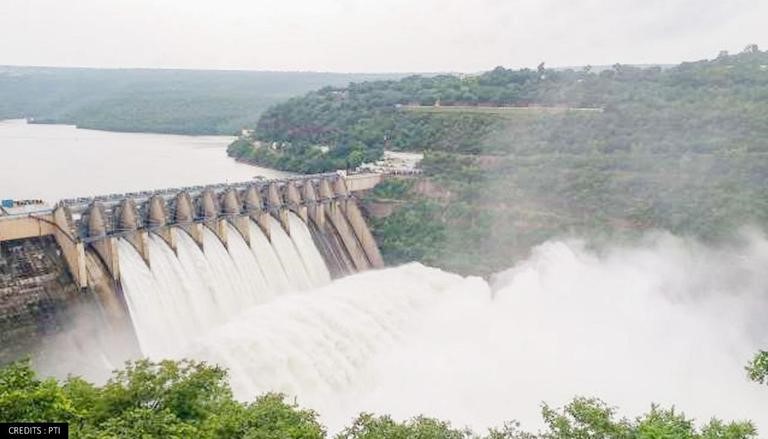
Current Affairs Notes By Success Mantra Coaching Institute GTB Nagar Delhi CLICK HERE
WHAT IS THE ISSUE?
Karnataka had sought the vacation on a SC order of November 16, 2011, that restrained the Central government from publishing the final order of Krishna Water Dispute Tribunal II (KWDT) in official gazette. This order was pronounced in 2010 and allocated the river water to Karnataka, Maharashtra and erstwhile Andhra Pradesh. KWDT had further modified its final order and reported in November 2013, to allocate surplus water to Karnataka, Maharashtra, and erstwhile Andhra Pradesh, while preserving the allocation of 2,130 TMC. However, after the bifurcation of erstwhile Andhra Pradesh, Telangana & Andhra Pradesh had moved to the Supreme Court and challenged the allocation share of the KWDT.
Stalled projects: Karnataka argued that its dam and irrigation projects to provide water in its parched northern areas were stalled for all these years due to the 2011 order of not publishing KWDT decisions in the Official Gazette in line with Section 6(1) of the Inter-State Water Disputes Act, 1956.
RECUSAL OF JUDGES FROM THE CASE
Recently, two judges of the Supreme Court have recused themselves from hearing a matter related to the distribution of Krishna water dispute between Andhra Pradesh, Telangana, Maharashtra and Karnataka. They cited the reason that they did not want to be the target of partiality since the dispute is related to their home states.
Recusal of Judges: It is the act of abstaining from participation in an official action such as a legal proceeding due to a conflict of interest of the presiding court official or administrative officer. When there is a conflict of interest, a judge can withdraw from hearing a case to prevent creating a perception that he carried a bias while deciding the case. There are no formal rules governing recusals, although several SC judgments have dealt with the issue. In Ranjit Thakur v Union of India (1987), the SC held that the test of the likelihood of bias is the reasonableness of the apprehension in the mind of the party. The judge needs to look at the mind of the party before him, and decide that he is biased or not.
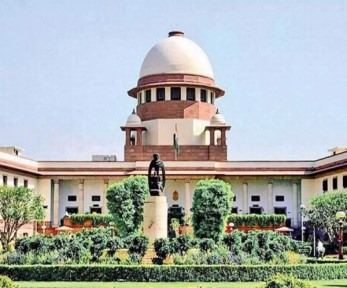
BACKGROUND OF THE DISPUTE
Krishna Water Disputes Tribunal: In 1969, the Krishna Water Disputes Tribunal (KWDT) was set up under the Inter-State River Water Dispute Act, 1956, and presented its report in 1973. At the same time, it was stipulated that the KWDT order may be reviewed or revised by a competent authority or tribunal any time after 31st May, 2000.
Second KWDT: The second KWDT was instituted in 2004. It delivered its report in 2010, which made allocations of the Krishna water at 65 % dependability and for surplus flows as follows: 81 TMC for Maharashtra, 177 TMC for Karnataka, and 190 TMC for Andhra Pradesh.
CONSTITUTIONAL PROVISIONS REGARDING THE ISSUE
Article 262 of the Constitution provides for the adjudication of inter-state water disputes. Under this, Parliament may by law provide for the adjudication of any dispute or complaint with respect to the use, distribution and control of waters of any inter-state river and river valley. The Parliament has enacted the two laws, the River Boards Act (1956) and the Inter-State Water Disputes Act (1956). The River Boards Act provides for the establishment of river boards by the Central government for the regulation and development of Inter-state River and river valleys. The Inter-State Water Disputes Act empowers the Central government to set up an ad hoc tribunal for the adjudication of a dispute between two or more states in relation to the waters of an inter-state river or river valley. Neither the Supreme Court nor any other court is to have jurisdiction in respect of any water dispute which may be referred to such a tribunal under this Act.
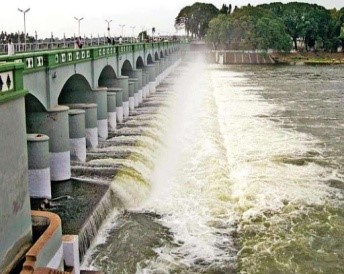
KRISHNA RIVER
- Source: It originates near Mahabaleshwar (Satara) in Maharashtra. It is the second biggest river in peninsular India after the Godavari River.
- Drainage: It runs from four states Maharashtra (303 km), North Karnataka (480 km) and the rest of its 1300 km journey in Telangana and Andhra Pradesh before it empties into the Bay of Bengal.
- Tributaries: Tungabhadra, Mallaprabha, Koyna, Bhima, Ghataprabha, Yerla, Warna, Dindi, Musi and Dudhganga.
RELATED: TELANGANA-ANDHRA PRADESH WATER DISPUTE
Telangana and Andhra Pradesh share stretches of the Krishna and the Godavari and own their tributaries. Both states have proposed several new projects without getting clearance from the river boards, the Central Water Commission and the Apex Council, as mandated by the Andhra Pradesh Reorganisation Act, 2014. The Andhra Pradesh Reorganisation Act, 2014 mandates for the constitution of an Apex Council by the Central Government for the supervision of the functioning of the Godavari River Management Board and Krishna River Management Board. The Apex Council comprises the Union Water Resources Minister and the Chief Ministers of Telangana and Andhra Pradesh.
The Andhra Pradesh government’s proposal to increase the utilisation of the Krishna water from a section of the river above the Srisailam Reservoir led to the Telangana government filing a complaint against Andhra Pradesh. The Srisailam reservoir is constructed across the Krishna River in Andhra Pradesh. It is located in the Nallamala hills. The Andhra Pradesh government retaliated with its own complaints saying that Palamuru-Rangareddy, Dindi Lift Irrigation Schemes on the Krishna River and Kaleshwaram, Tupakulagudem schemes and a few barrages proposed across the Godavari are all new projects.
PRAVAHINI Current Affairs Notes By Success Mantra Coaching Institute GTB Nagar Delhi CLICK HERE
TEST YOURSELF
Q.1 Which of the following articles of the Indian Constitution provides for the adjudication of inter-state water disputes?
- Article 262: ANSWER
- Article 250
- Article 32
- None of the following
Q.2 The Krishna River water Dispute is among which of the following given states?
- Kerala, Karnataka, Andhra Pradesh, and Tamil Nadu
- Maharashtra, Karnataka, Andhra Pradesh, and Telangana: ANSWER
- Maharashtra, Gujarat, Andhra Pradesh, and Telangana
- None of the following
Q.3 Which of the following states is not one of the party’s states of Godavari Water Dispute?
- Maharashtra
- Karnataka
- Tamil Nadu: ANSWER
- Odisha
Q.4 When was the Ravi & Beas Waters Tribunal constituted for verification of the quantum of usage of water claimed by Punjab, Haryana and Rajasthan?
- January, 1987
- April, 1986: ANSWER
- March, 1989
- November, 1990
Q.5 Which of the following statements is/are incorrect regarding the inter-state Dispute?
- Article 262 of the constitution empowers the state legislatures to make laws for the adjudication of inter-state water dispute: ANSWER
- The Inter-State Water Disputes Act 1956 was enacted to deal with inter-state water disputes.
- The Government of India can constitute a tribunal to hear the disputes concerning claims of water sharing.
- The members of tribunal are appointed by the Chief justices of India.










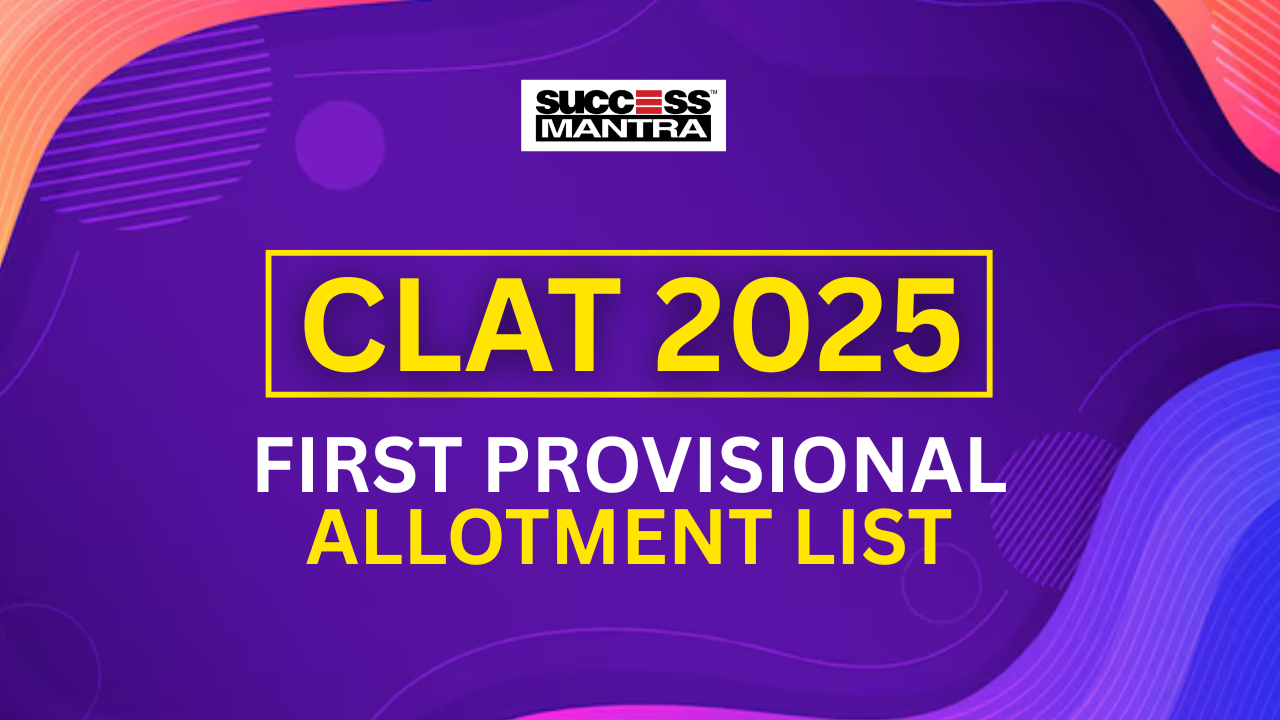


eclldyvszf
SC ON KRISHNA RIVER WATER DISPUTE | Read Daily Article Editorials Only On Success Mantra Blog | Daily Article | Monthly Article | Weekly Article | Yearly Article | Most Requesting Articles | Legal Awareness Articles | Current Affairs | Passage Based Current Affairs | One Linear Current Affairs | Current Affairs For CLAT | Current Affairs For AILET | Current Affairs For Slat | Legal Aptitude Current Affairs | Law Current Affairs | Current Event | Current Affairs Pdf | Current Affairs Pdf In English | Current Affairs Pdf Free Download | Current Affairs MCQ | Current Affairs MCQS | Current Affairs Work Sheet | Current Affairs UPSC | Current Affairs BBA | Current Affairs BCA | Current Affairs BJMC | Current Affairs NCHMJEE | Daily Editorial | Monthly Editorial | Weekly Editorial | Yearly Editorial | Most Asking Editorials | Legal Awareness Editorials | Current Editorial | Passage Based Current Editorial | One Linear Current Editorial | Current Editorial For CLAT | Current Editorial For AILET | Current Editorial For Slat | Legal Aptitude Current Editorial | Law Current Editorial | Current Event | Current Editorial Pdf | Current Editorial Pdf In ENGLISH | Current Editorial Pdf Free Download | Current Editorial MCQ | Current Editorial MCQS | Current Editorial Work Sheet | Current Editorial UPSC | Current Editorial BBA | Current Editorial BCA | Current Editorial BJMC | Current Editorial NCHMJEE | Latest News In India | Latest News In Hindi | Latest News Delhi | Latest News Today India | Latest News Live | 3 Latest News | Latest News Today Delhi | Latest News Aajtak | News Articles India | News Articles For Students | News Articles 2022 | News Articles In English | News Articles In Hindi | News Article Example | Short News Articles | News Article Meaning | Success Mantra Delhi | CLAT Coaching In Delhi | Best CLAT Du LLB Institute In Delhi | Read Daily Article Editorials Only On Success Mantra Blog <a href="http://www.gi1oq10111lls1iop5kp3ytd0351763as.org/">aeclldyvszf</a> [url=http://www.gi1oq10111lls1iop5kp3ytd0351763as.org/]ueclldyvszf[/url] eclldyvszf http://www.gi1oq10111lls1iop5kp3ytd0351763as.org/
dykdlemib
SC ON KRISHNA RIVER WATER DISPUTE | Read Daily Article Editorials Only On Success Mantra Blog | Daily Article | Monthly Article | Weekly Article | Yearly Article | Most Requesting Articles | Legal Awareness Articles | Current Affairs | Passage Based Current Affairs | One Linear Current Affairs | Current Affairs For CLAT | Current Affairs For AILET | Current Affairs For Slat | Legal Aptitude Current Affairs | Law Current Affairs | Current Event | Current Affairs Pdf | Current Affairs Pdf In English | Current Affairs Pdf Free Download | Current Affairs MCQ | Current Affairs MCQS | Current Affairs Work Sheet | Current Affairs UPSC | Current Affairs BBA | Current Affairs BCA | Current Affairs BJMC | Current Affairs NCHMJEE | Daily Editorial | Monthly Editorial | Weekly Editorial | Yearly Editorial | Most Asking Editorials | Legal Awareness Editorials | Current Editorial | Passage Based Current Editorial | One Linear Current Editorial | Current Editorial For CLAT | Current Editorial For AILET | Current Editorial For Slat | Legal Aptitude Current Editorial | Law Current Editorial | Current Event | Current Editorial Pdf | Current Editorial Pdf In ENGLISH | Current Editorial Pdf Free Download | Current Editorial MCQ | Current Editorial MCQS | Current Editorial Work Sheet | Current Editorial UPSC | Current Editorial BBA | Current Editorial BCA | Current Editorial BJMC | Current Editorial NCHMJEE | Latest News In India | Latest News In Hindi | Latest News Delhi | Latest News Today India | Latest News Live | 3 Latest News | Latest News Today Delhi | Latest News Aajtak | News Articles India | News Articles For Students | News Articles 2022 | News Articles In English | News Articles In Hindi | News Article Example | Short News Articles | News Article Meaning | Success Mantra Delhi | CLAT Coaching In Delhi | Best CLAT Du LLB Institute In Delhi | Read Daily Article Editorials Only On Success Mantra Blog dykdlemib http://www.gywr2k3681d5p6rpi6110v7ol45a5tr0s.org/ [url=http://www.gywr2k3681d5p6rpi6110v7ol45a5tr0s.org/]udykdlemib[/url] <a href="http://www.gywr2k3681d5p6rpi6110v7ol45a5tr0s.org/">adykdlemib</a>
pwkoeygzdx
SC ON KRISHNA RIVER WATER DISPUTE | Read Daily Article Editorials Only On Success Mantra Blog | Daily Article | Monthly Article | Weekly Article | Yearly Article | Most Requesting Articles | Legal Awareness Articles | Current Affairs | Passage Based Current Affairs | One Linear Current Affairs | Current Affairs For CLAT | Current Affairs For AILET | Current Affairs For Slat | Legal Aptitude Current Affairs | Law Current Affairs | Current Event | Current Affairs Pdf | Current Affairs Pdf In English | Current Affairs Pdf Free Download | Current Affairs MCQ | Current Affairs MCQS | Current Affairs Work Sheet | Current Affairs UPSC | Current Affairs BBA | Current Affairs BCA | Current Affairs BJMC | Current Affairs NCHMJEE | Daily Editorial | Monthly Editorial | Weekly Editorial | Yearly Editorial | Most Asking Editorials | Legal Awareness Editorials | Current Editorial | Passage Based Current Editorial | One Linear Current Editorial | Current Editorial For CLAT | Current Editorial For AILET | Current Editorial For Slat | Legal Aptitude Current Editorial | Law Current Editorial | Current Event | Current Editorial Pdf | Current Editorial Pdf In ENGLISH | Current Editorial Pdf Free Download | Current Editorial MCQ | Current Editorial MCQS | Current Editorial Work Sheet | Current Editorial UPSC | Current Editorial BBA | Current Editorial BCA | Current Editorial BJMC | Current Editorial NCHMJEE | Latest News In India | Latest News In Hindi | Latest News Delhi | Latest News Today India | Latest News Live | 3 Latest News | Latest News Today Delhi | Latest News Aajtak | News Articles India | News Articles For Students | News Articles 2022 | News Articles In English | News Articles In Hindi | News Article Example | Short News Articles | News Article Meaning | Success Mantra Delhi | CLAT Coaching In Delhi | Best CLAT Du LLB Institute In Delhi | Read Daily Article Editorials Only On Success Mantra Blog [url=http://www.g04259v0byp5uc6o1ailb8ev620as301s.org/]upwkoeygzdx[/url] <a href="http://www.g04259v0byp5uc6o1ailb8ev620as301s.org/">apwkoeygzdx</a> pwkoeygzdx http://www.g04259v0byp5uc6o1ailb8ev620as301s.org/
hzibbimpjb
SC ON KRISHNA RIVER WATER DISPUTE | Read Daily Article Editorials Only On Success Mantra Blog | Daily Article | Monthly Article | Weekly Article | Yearly Article | Most Requesting Articles | Legal Awareness Articles | Current Affairs | Passage Based Current Affairs | One Linear Current Affairs | Current Affairs For CLAT | Current Affairs For AILET | Current Affairs For Slat | Legal Aptitude Current Affairs | Law Current Affairs | Current Event | Current Affairs Pdf | Current Affairs Pdf In English | Current Affairs Pdf Free Download | Current Affairs MCQ | Current Affairs MCQS | Current Affairs Work Sheet | Current Affairs UPSC | Current Affairs BBA | Current Affairs BCA | Current Affairs BJMC | Current Affairs NCHMJEE | Daily Editorial | Monthly Editorial | Weekly Editorial | Yearly Editorial | Most Asking Editorials | Legal Awareness Editorials | Current Editorial | Passage Based Current Editorial | One Linear Current Editorial | Current Editorial For CLAT | Current Editorial For AILET | Current Editorial For Slat | Legal Aptitude Current Editorial | Law Current Editorial | Current Event | Current Editorial Pdf | Current Editorial Pdf In ENGLISH | Current Editorial Pdf Free Download | Current Editorial MCQ | Current Editorial MCQS | Current Editorial Work Sheet | Current Editorial UPSC | Current Editorial BBA | Current Editorial BCA | Current Editorial BJMC | Current Editorial NCHMJEE | Latest News In India | Latest News In Hindi | Latest News Delhi | Latest News Today India | Latest News Live | 3 Latest News | Latest News Today Delhi | Latest News Aajtak | News Articles India | News Articles For Students | News Articles 2022 | News Articles In English | News Articles In Hindi | News Article Example | Short News Articles | News Article Meaning | Success Mantra Delhi | CLAT Coaching In Delhi | Best CLAT Du LLB Institute In Delhi | Read Daily Article Editorials Only On Success Mantra Blog <a href="http://www.g2m4a45x14jr4dh57v7011f8iloak65xs.org/">ahzibbimpjb</a> hzibbimpjb http://www.g2m4a45x14jr4dh57v7011f8iloak65xs.org/ [url=http://www.g2m4a45x14jr4dh57v7011f8iloak65xs.org/]uhzibbimpjb[/url]
skfmklvdfv
Latest News on Education & LAW Exams Blogs | Success Mantra skfmklvdfv http://www.g5uv663uxy4x1s9ei5n2877p755sux8ys.org/ [url=http://www.g5uv663uxy4x1s9ei5n2877p755sux8ys.org/]uskfmklvdfv[/url] <a href="http://www.g5uv663uxy4x1s9ei5n2877p755sux8ys.org/">askfmklvdfv</a>
vysyvixnx
Latest News on Education & LAW Exams Blogs | Success Mantra vysyvixnx http://www.g50myih7ipu900c22lo163n40f6ba77rs.org/ [url=http://www.g50myih7ipu900c22lo163n40f6ba77rs.org/]uvysyvixnx[/url] <a href="http://www.g50myih7ipu900c22lo163n40f6ba77rs.org/">avysyvixnx</a>
nmitdqrit
Latest News on Education & LAW Exams Blogs | Success Mantra [url=http://www.gl7k0ta70x165qg17ymyhr63783r38mrs.org/]unmitdqrit[/url] <a href="http://www.gl7k0ta70x165qg17ymyhr63783r38mrs.org/">anmitdqrit</a> nmitdqrit http://www.gl7k0ta70x165qg17ymyhr63783r38mrs.org/
poswhwccof
Latest News on Education & LAW Exams Blogs | Success Mantra <a href="http://www.gb3ea194pcd560k7d4mvp04y943a4do1s.org/">aposwhwccof</a> [url=http://www.gb3ea194pcd560k7d4mvp04y943a4do1s.org/]uposwhwccof[/url] poswhwccof http://www.gb3ea194pcd560k7d4mvp04y943a4do1s.org/